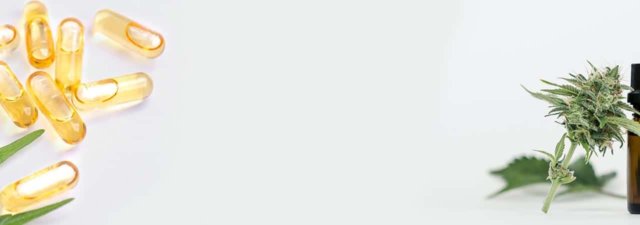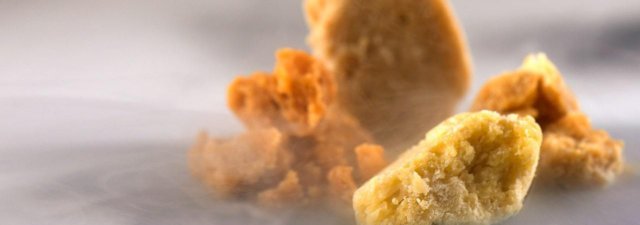There are 113 identified cannabinoids in the marijuana plant. Researchers also say there are hundreds of other compounds, including terpenes and flavonoids. However, the prohibited status of cannabis means research into its properties is limited. We are aware of THC and CBD primarily because they are generally the two most abundant cannabinoids.
It is easy to assume that these are two of the few cannabinoids with potential benefits. In reality, however, the little research that has occurred regarding other compounds paints a different picture.
It seems that the compounds in cannabis and hemp work better together than in isolation. This phenomenon is called the ‘entourage effect.’
It is also possible that individual cannabinoids and terpenes have specific uses. There are dozens of non-intoxicating cannabinoids in weed and plenty that could cause a high. Of course, THC aside, there isn’t enough of any intoxicating cannabinoid available to cause this effect by itself.
One cannabinoid that is beginning to garner attention is THCA. In this guide, we look into it and also determine how it differs from THC.
What Is THCA?
Those with any knowledge of cannabis are likely aware of THC. It is the molecule known to produce the famous intoxicating high that so many people love. Modern-day breeders deliberately grow plants with as high a THC content as possible. What many people don’t realize is that the compound is only available in minuscule amounts in raw marijuana.
You can decarboxylate weed it by exposing it to heat. The process of vaporizing or smoking cannabis performs this task automatically. You can also ‘decarb’ by drying and curing the buds. However, this process takes a relatively long time.
THCA is the “precursor” acid to THC. While THC and THCA are nearly identical in terms of chemical structure, they have a few molecular differences. These account for radical changes in the way they affect the brain.
Namely, THCA does not produce any psychoactive, mind-altering effects. This is why you could hypothetically eat a bunch of raw marijuana buds, and hardly get high at all.
Yet THCA is far from inactive regarding the effect that it has on humans. Instead of producing an intoxicating high, for instance, it potentially possesses dozens of therapeutic health benefits. These include analgesic (pain-relieving), anti-inflammatory, and neuroprotective properties.

https://www.analyticalcannabis.com/articles/thca-vs-thc-what-are-the-differences-312205
Like every other cannabinoid, THCA comes from CBGA. As plants mature, their enzymes convert the CBGA into one of three cannabinoid precursor cannabinoids: THCA, CBDA, and CBCA.
THC and THCA are similar molecules. However, THCA’s 3D shape means it is too large to fit into the cannabinoid receptors, particularly CB1 receptors. The reason why THC causes intoxication is that it fits into your body’s CB1 receptors.
When THCA gets heated to extreme temperatures (i.e., when you smoke or vaporize it), it becomes THC. It produces a high at this stage.
What Properties Does THCA Possess?
First of all, it is necessary to issue a disclaimer of sorts. There isn’t enough research into THCA to confidently state what it is capable of. That said, the studies which have looked into the cannabinoid provide positive outcomes in general. One suggestion is that THCA stimulates the appetite like THC. It acts as a cannabinoid receptor in itself and has potential neuroprotective benefits.
Here is a more detailed list of the possible properties associated with THCA. Bear in mind, that we need significantly more research:
- Analgesic
- Antiemetic
- Neuroprotective
- Helps with insomnia
- Modulates the immune system
- Anti-inflammatory
There are a few research papers on THCA’s possible benefits. A study by Ruhaak et al., published in Biological & Pharmaceutical Bulletin in 2011, investigated six cannabinoids. The researchers wanted to evaluate the cyclooxygenase inhibiting effects of these cannabinoids. They found that THCA demonstrated anti-inflammatory properties.
A study by Moldzio et al., published in Phytomedicine in June 2012, looked at THC and THCA. According to the research, THCA could protect against neurodegenerative diseases.
Rock et al. published a study in the British Journal of Pharmacology in July 2013. Researchers found that THCA and CBDA were effective in the reduction of vomiting and nausea. Indeed, their efficacy exceeded that of THC and CBD. The study was on rodents, but it was promising nonetheless.
As you can see by the dates of these studies, however, there is little in the way of recent research. Scientists have a hard enough time trying to get funding for THC and CBD experiments!
How Can I Use THCA?
How do you use THCA and take advantage of its medical capabilities, without smoking it and turning it into THC? One method is by trimming raw cannabis buds and ‘juicing’ the plant matter. We have a tremendous raw cannabis recipe smoothie recipe on this very site. It is a quick and easy way to make the most out of THCA.
Another option is to steep it in hot water and call it THCA Tea. This process exposes the compound to a relatively low temperature, which means it doesn’t turn into THC. Other options include using it as a garnish or creating salad dressings.
Please note that you must not expose the cannabis to a temperature of above 250 degrees Fahrenheit. If you do, you will ensure it breaks down into THC.
Dr. William Courtney of the Cannabis International group has an interesting theory. He believes raw cannabis offers 1,000 times the amount of therapeutic cannabinoid acids (i.e., THCA) than its smoked or vaporized counterpart.
Incidentally, CBD has many of the same properties as THC oil, according to research. It is also non-intoxicating. Check out this article on CBD hemp oil. Proponents claim it can help improve sleep, reduce pain, and alleviate anxiety.
Can You Smoke THCA?
As THCA breaks down into THC when exposed to heat, the answer is a definite ‘no.’ Best estimates suggest that exposing THCA to 212 degrees Fahrenheit for four hours would cause it to convert into THC completely. If you smoke or vaporize raw cannabis, you will lose the THCA.
You now understand that THCA becomes THC when smoked or vaporized. You are also aware the process happens more slowly when the herb is dried and cured. However, there are many other ways for the decarboxylation process to take place:
- Room Temperature: Leave THCA out in the open long enough, and you end up with THC. In olive oil, for example, keeping the THCA exposed to 77 degrees for ten days will see 22% of THCA convert. In an ethanol extraction, this percentage rises to 67%. Even weed kept in a room with minimal light exposure will see as much as 20% THCA become THC over a long period.
- Sunlight: The same rules apply. Much depends on the overall temperature. However, THCA molecules become THC when exposed to sunlight for long enough.
- An Oven: When making cannabutter, one of the most common ways to ‘decarb’ cannabis is by putting it in an oven. Sprinkle the raw cannabis on a piece of parchment paper. Then, put it in the oven at 230 degrees Fahrenheit. Depending on the moisture content of the bud, you will have ‘activated’ THC in as little as 30 minutes. However, it can take up to 90 minutes.
Why Do Dispensaries Label THCA Content?
Have you ever noticed your dispensary label the amount of THCA in a strain instead of THC? As such, you must account for it when calculating a strain’s potency.
One of the most popular techniques for measuring potency in weed is gas chromatography. This method involves applying heat to the plant matter you test. This process decarbs cannabis and converts its THCA into THC. The potency is measured in percentage terms, which gives us a neat and tidy figure. At least, that’s the theory.
In practice, the heating and decarbing processes result in the weed losing a significant amount of weight. This is because the THCA molecules lose lots of their carbonyl groups. As a result, interested parties can use the following formula to try and get an accurate THC level:
THC = (% THCA) x (Final Mass/Initial Mass) + (% THC)
For some, the formula above provides them with a ‘maximum’ THC level. However, when you smoke marijuana, not all of the THCA converts into THC. It is overly simplistic to suggest that 30% THCA means 30% THC. In reality, anywhere from 30% to 70% of THCA in any given strain isn’t converted into THC when you smoke it.
Final Thoughts on THCA
Ultimately, the cannabis you consume contains significant amounts of THCA when it is raw. Once you decarboxylate it, this compound is converted into THC, the cannabinoid that provides an intoxicating high. There isn’t a massive difference between the two in molecular terms. However, they produce substantially different effects on the human body and brain. THCA does not cause intoxication.
Even so, proponents of raw marijuana claim it has a myriad of health benefits. Whether you want to explore this form of weed is another matter. Just note that exposure to significant levels of heat will ensure the THCA is ‘replaced’ by THC. You can try THCA by creating a raw weed smoothie, or by treating it as a leafy green!
Found this article interesting? Share it or ask a question.


![Bisabolol Cannabis Terpene [All You Need to Know]](https://wayofleaf.com/wp-content/uploads/2020/11/wol-banner-bisabolol-cannabis-terpene-640x225.jpg)
![What Is Limonene? [Ultimate Cannabis Terpene Guide]](https://wayofleaf.com/wp-content/uploads/2020/04/what-is-limonene-1-640x225.jpg)

![What Is Pinene? [Cannabis Terpene Benefits]](https://wayofleaf.com/wp-content/uploads/2019/12/wol-banner-what-is-pinene-640x225.jpg)
![What Is Myrcene? [The Cannabis Terpene Explained]](https://wayofleaf.com/wp-content/uploads/2019/10/mj_mj_what_is_myrcene_1920-min-640x225.jpg)
![What Is CBDV? [Effects, Strains, and More]](https://wayofleaf.com/wp-content/uploads/2019/09/mj_what_is_cbdv_1920-min-640x225.jpg)


![The Marihuana Tax Act of 1937 [All You Need to Know]](https://wayofleaf.com/wp-content/uploads/2019/01/history-of-the-marihuana-tax-act-640x225.jpg)

![What Is “Mids” Weed? [Explained for the Cannabis Rookie]](https://wayofleaf.com/wp-content/uploads/2018/11/what-is-mids-weed-explained-for-the-cannabis-rookie-640x225.jpg)
![Where Does Cannabis Originate From? [Facts and Myths]](https://wayofleaf.com/wp-content/uploads/2018/05/wol-banner-where-does-cannabis-originate-from-640x225.jpg)
